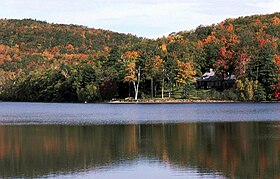Mont Saint-Bruno
| Mont Saint-Bruno | |
|---|---|
 |
|
| Highest point | |
| Elevation | 218 m (715 ft) |
| Prominence | 170 metres (560 ft) |
| Coordinates | 45°33′01″N 73°19′09″W / 45.55028°N 73.31917°WCoordinates: 45°33′01″N 73°19′09″W / 45.55028°N 73.31917°W |
| Geography | |
| Location | Saint-Bruno-de-Montarville, 23 kilometres east of Montreal, Quebec, Canada |
| Parent range | Monteregian Hills |
| Topo map | NTS 031H/11 |
| Geology | |
| Age of rock | Early Cretaceous |
| Mountain type | Intrusive |
Mont Saint-Bruno is part of the Monteregian Hills in southern Quebec, Canada. Its summit stands 213 m (699 ft) high and lies 23 km (14 mi) east of downtown Montreal.
This mountain has a ski resort, a natural area, and an apple orchard. Forests of beech, maple, oak, hickory, ironwood, hemlock and pine cover those slopes which have not been cleared for agriculture or skiing. The apple orchard is an agricultural research station operated by IRDA (The Research and Development Institute for the Agri-Environment of Québec).
A provincial park Parc national du Mont-Saint-Bruno encompasses part of the mount, which also contains ski slopes Ski Mont Saint-Bruno. A quarry also occupies part of it. Mont Saint-Bruno is also home to a small Canadian Forces training camp where new recruits from the Canadian Forces Leadership and Recruit School learn navigation and topography.
Mont Saint-Bruno might be the deep extension of a vastly eroded ancient volcanic complex, which was probably active about 125 million years ago. The mountain was created when the North American Plate moved westward over the New England hotspot, along with the other mountains of the Monteregian Hills. As a result, Mont Saint-Bruno forms part of the Great Meteor hotspot track. Its igneous rock consists mostly of pyroxenite and gabbro.
...
Wikipedia
